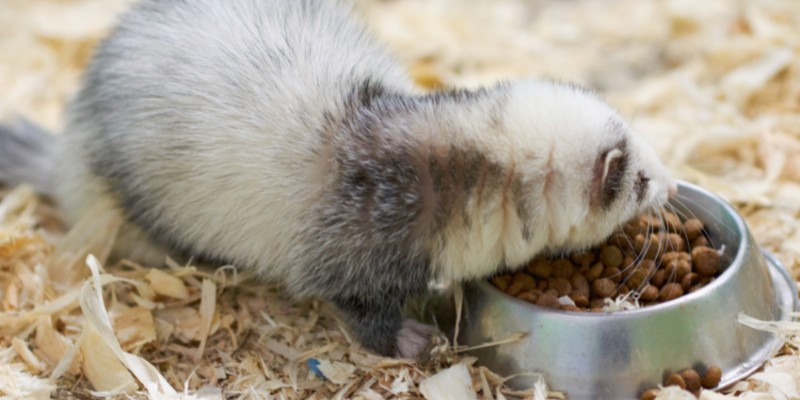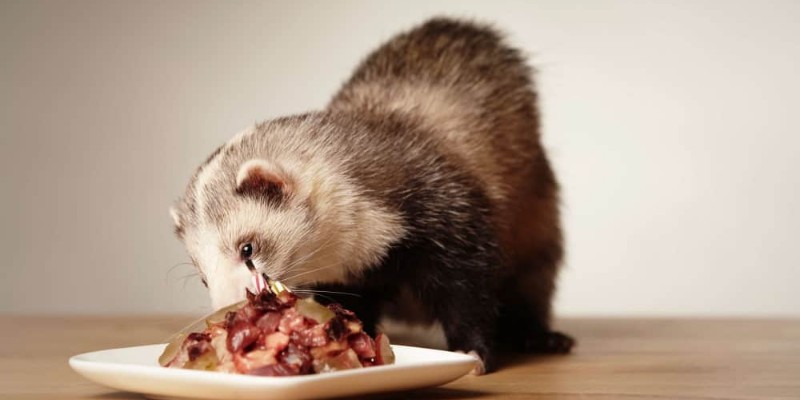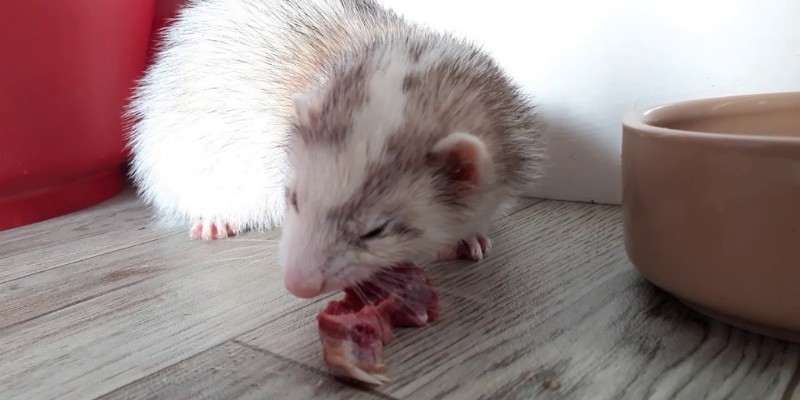Often used in the game industry for hunting rabbits, ferrets are becoming a top choice of pets for those looking to have smaller animals in their homes due to their loyal, cuddly, and low-maintenance care. But what can ferrets eat?
As natural carnivores, a ferret’s diet consists mainly of proteins such as chicken that are low fat but still full of meaty goodness. However, unlike our cats and dogs, a ferret’s diet is much more specific than their other pet counterparts, therefore it is essential when bringing a ferret into your home to know exactly what to feed them.
Ferrets are unable to digest food that we often give a sneaky nibble to our cats and dogs, and feeding your ferret these foods is the difference between a healthy pet and a nasty trip to the vet.
To get a better understanding of what to feed and not to feed your pet, read on for an in-depth guide on what’s good, bad, and the best for your ferret!
Contents
What Can Ferrets Eat Every Day?
Like any mammal, a ferret’s diet needs to include protein to provide the fundamental vitamins and minerals for their bodies to stay in tip-top shape. Ferrets are able to process both dry and wet food, but dry kibble is considered the best food for ferrets as the crunchy exterior helps maintain healthy teeth and gums.
Often, your ferret will consume between 5-7% of their body weight in food every day. During growth, pregnancy, or in mating season, your ferret will need to consume more. It is massively important to manage what your ferret eats during their whole life as this will change depending on age, for example, baby ferrets need high amounts of protein to help manage their growth and development.

It’s important to note that your ferret cannot eat the same kibble as your dog or cat as the ingredients and protein levels will not be sufficient for your ferret’s needs. Always choose kibble specifically formulated for ferret’s to ensure your lovebug’s health.
Can Ferrets Eat Whole Prey?
Whole prey such as mice and chicks can be a fantastic food option for your little furry friend. Closely relating to what they would do in the wild, whole prey offers a natural and nutritionally beneficial meal for your ferret.
However, like all diets, balance is the key to healthiness. If you choose a whole prey alternative, be sure to feed your ferret a variety of between 2 to 3 different protein sources to ensure they get all the minerals and vitamins needed to stay happy and wholesome.
With no added nastiness, whole prey is a healthy alternative to kibble feeding, but it’s not for the faint-hearted. Be aware whenever feeding your ferret whole prey or raw meat, ferrets often hide their food to consume later which can lead to cuts of meat becoming exposed to nasty bacteria if not eaten or removed from their cage in a timely manner.
Can Ferrets Eat Other Pet Food?
Just as we don’t serve our cats and dogs the same meals, the same applies to your ferret. With smaller digestive systems than other pets, ferrets can’t process foods that they don’t regularly consume.
With various ingredients such as veggies, botanicals, and more importantly grains, stuffed into your dog or cat’s regular dinners, these seemingly harmless ingredients are detrimental to your ferret’s health and should be avoided.
However, dry kitten kibble (that is high-protein based) can be fed to your ferret as it contains the correct meat percentages (35-40%) suitable for their regular diet. Adult cat food is not recommended as it doesn’t contain the right level of protein suitable for your ferret’s diet.
Feeding Your Ferret
It’s recommended to feed your ferret once a day. Place no more than a handful of their kibble into a small dish, or for some extra fun and forage for food, place it into a hanging coconut feeder.
Hot Tip!: During their heat season (May to September), you may notice your female ferret (Jill) losing weight. This is perfectly normal as their hormones become unbalanced whilst waiting to mate or have their hormonal jabs. If you notice your ferret losing a little more weight during this period, add an extra scoop of food into their dish daily to keep them happy and healthy whilst in heat.
Why Is Meat So Beneficial?
No matter what protein source you choose to give your ferret, each has a significant impact on their overall health and wellbeing. As natural carnivores, meat is not just a source of food your ferret enjoys but a food source they genuinely cannot live without.

The main benefits of meat include:
Packed With Amino Acids
Offal is a great treat for your ferret as it is rich in Taurine. This essential amino acid works by supporting the brain’s communication with your ferret’s muscles. Ferrets cannot naturally produce taurine so adding natural supplements to your ferret’s diet is a great way to ensure they get all the healthy and wholesome support they need.
Rich in Iron
The mating season for Jills (female ferrets) may be a dangerous and scary time as not mating your ferret can lead to anemia which can be fatal for your furry friend. However, getting your Jill jabbed, mated, or even spayed will help reduce the chances of anemia occurring.
Rich in iron to help support our body’s cardiovascular system, red meat during their mating season supports your Jill’s nutrition by keeping their blood and heart working exactly as they should.
Reduce Obesity in Older Ferrets
Low-fat content in poultry such as chicken and turkey is a great food source for older ferrets who aren’t as active as their younger counterparts.
Weight gain can lead to fatty deposit build-up on your ferret’s internal organs, including their heart, and lead to serious health problems. Leaner proteins ensure your ferret isn’t absorbing too much fat in their diet and keeps them lean and lively for their golden ages of health.
Easy and Affordable
When it comes to topping up your ferret’s food with potential treats, meat is a great way of rewarding your ferret when they’ve managed not to steal your socks.
Red meat can be given raw or cooked, but poultry such as turkey and chicken should be cooked to avoid your ferrets contracting harmful salmonella bacteria. We encourage the use of white meat aside from pork which can also harbor harmful bacteria.
What makes these tasty treats so fantastic for us humans too is that they are easy to access and affordable. Ferrets are able to consume all pieces of a single protein source (be cautious of giving your ferrets bones) so purchasing their favorite snack is something you can pick up when out at the store.
What Foods Are Safe for Ferrets?
Despite the desire to treat your ferret to left overs from your dinner plate, it’s vital that you never give your ferret scraps of your own food. Due to their small size and natural meat-loving nature, there are many foods that are harmful to these mischievous pets.
To help you understand the do’s and don’ts when it comes to feeding your ferret, we’ve composed a list of all your ferrets’ favorite foods and what to avoid with your little furry friend.
Tempt With Turkey
Not just for Thanksgiving, this perfect poultry is one of the best protein sources for your little four-legged friend. Rich in protein, but not too high in fat, this marvelous meat is a great treat for your ferret. As ferrets have smaller digestive tracts than other household pets, turkey is easily digestible and kind to their tummies.
Ensure you thoroughly cook any poultry source before giving it to your ferret. Ferrets are able to eat parts of turkey not tempting for us humans, so don’t be afraid of adding giblets to their diet too!
Beef is Brillant
Best-served in its raw form, beef is blissfully beneficial to your four-legged friend. Packed full of healthy nutrients to support their overall growth and wellbeing, feeding your ferret beef in its natural form is one of the finest foods closest to their ancestral diet.
Any cuts of beef are a great treat for your ferret and offal can provide extra immune support for their overall health and wellbeing. Be cautious when giving your ferret meat as they have a tendency to hide their food leading to pieces of meat spoiling in corner of their cage.

Enjoy Eggs
Eggs are an eggcellent (yes, we said it) choice of food for your ferret as they contain high amounts of protein that your ferrets know and love. Eggs can be fed to your ferret in both cooked and raw form but it is important not to be tempted to add any milk or butter if scrambling them for your furry friends.
Packed with pawfuls of Vitamin D (brilliant for bone and muscle maintenance), eggs are a terrific treat for your ferret. However, don’t overfeed your ferret eggs as overconsumption can lead to constipation.
What Can’t Ferrets Eat?
Like hedgehogs, ferrets are lactose intolerant so any milk-based products must be strictly avoided. Unable to produce the enzyme that digests the sugars (lactose) in milk, giving your ferret dairy produce can leave them with a tricky and troublesome tummy.
No milk, cheese, yogurt, or ice cream (well our dogs love it too) must be given to your ferret under any circumstances. Giving your ferret any lactose-based product could lead to bouts of:
- Vomiting
- Diarrhea
If you suspect your ferret might have consumed any milk-based products, it’s important to seek veterinary advice as severe diarrhea and vomiting can lead to dehydration in your ferret.
Avoid Fruits and Vegetables
Although we might give a portion of our 5-a-day to our canines, our ferret’s digestive systems cannot process fruit and veggies as we do. Unlike other smaller mammals such as rabbits and guinea pigs, veggies like carrots and lettuce should be avoided as they lead to gastrointestinal problems in your furry friends.
Despite being beneficial for human health, vegetables contain a specific protein that your ferrets cannot digest. Overconsumption of these foods can have an impact on your ferret’s tummy and lead to problems such as bladder stones, gastroenteritis, and even issues with reproduction. If you let ferrets wander around your room, keep any vegetables well out of reach from nibbly noses.
What Can Ferrets Eat?: Variety is Key
Even as humans, we are consistently informed that the best diet is one that is both healthy and full of variety. So when it comes to understanding what ferrets can eat, the same logic applies to our little furry friends. As natural carnivores, ferrets are used to eating a variety of animal proteins and products so no one meat fits all.
We recommend mixing up the meats you decide to feed your ferret sticking to:
- Red meats such as beef and lamb
- Poultry such as chicken and turkey
- Game meats such as rabbit, venison
Ultimately, we recommend that your ferret’s main diet is made up of a high-protein dry kibble that has been created specifically for ferrets. Many brands can be found online and bought in bulk, saving you money in the process.
If you wish to supplement your ferret’s diet, give them a meaty treat once a week to give them a healthy, wholesome, and most importantly natural, boost to keep them healthier and happier for longer. No matter what meat you decide to give your ferret, we guarantee their whiskers will be waving until the very last bite.






